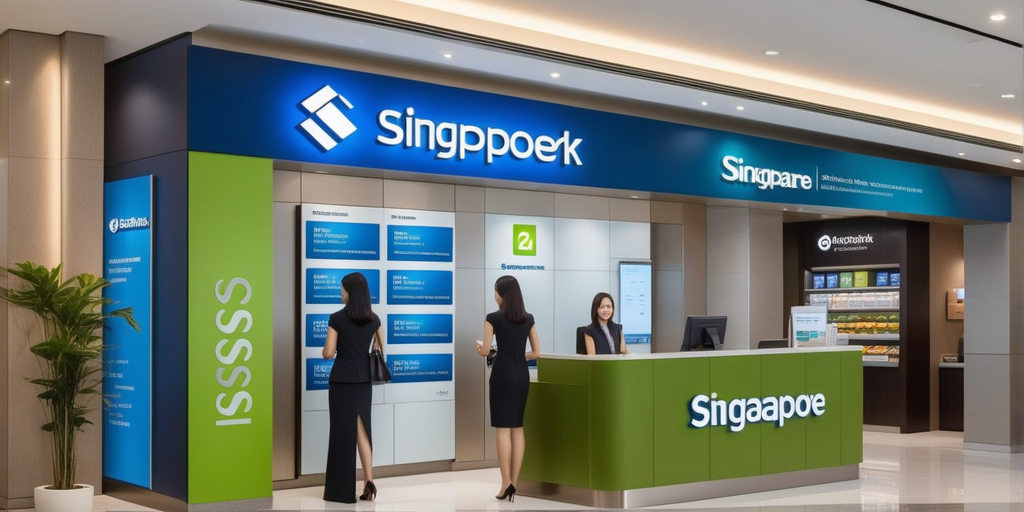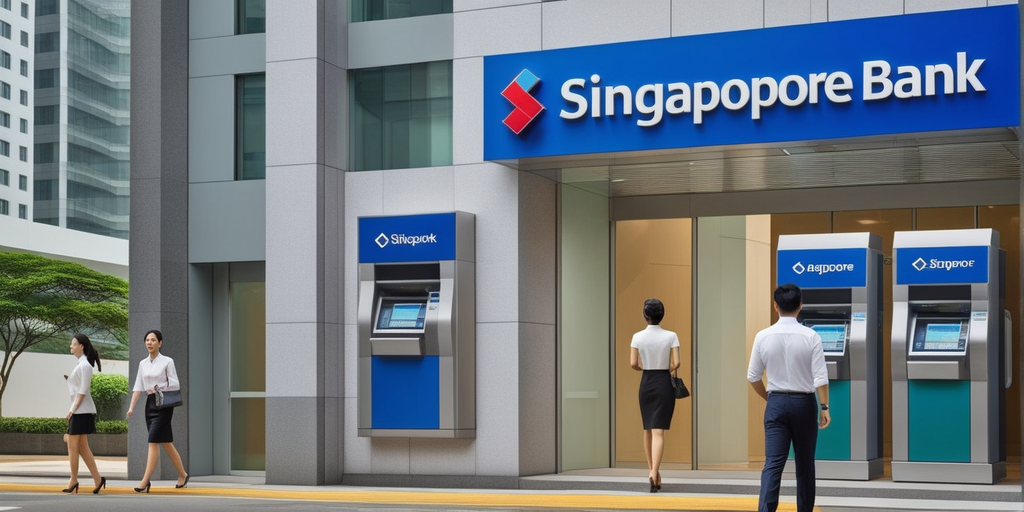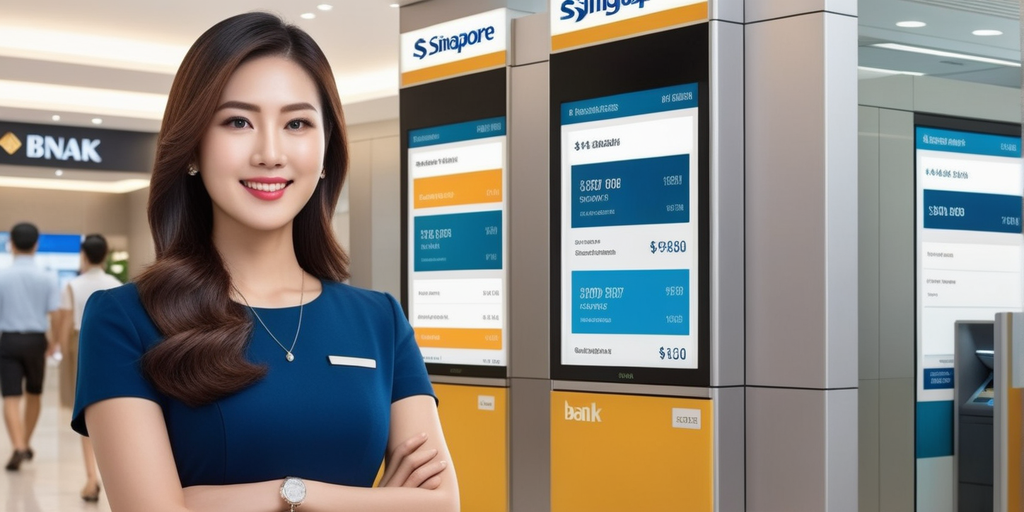If you’re planning to purchase a property in Singapore, you’ll need to decide between getting an HDB loan or a bank loan. Both options have their own advantages and disadvantages, and it’s important to understand the differences between them to make an informed decision.

HDB loans are offered by the Housing and Development Board (HDB) and are designed to help Singaporeans purchase a flat. The loans come with a fixed interest rate and a repayment period of up to 25 years. On the other hand, bank loans are offered by commercial banks and come with a variable interest rate that can be either fixed or floating. The repayment period for bank loans can be up to 35 years.
One of the main factors to consider when choosing between an HDB loan and a bank loan is your eligibility criteria. While HDB loans are only available to Singapore citizens and permanent residents, bank loans are open to anyone, regardless of their nationality. Additionally, HDB loans have a maximum loan-to-value (LTV) limit of 90%, while bank loans can go up to 75% LTV. It’s important to carefully evaluate your financial situation and determine which loan option is best for you.
Key Takeaways
- HDB loans are only available to Singapore citizens and permanent residents, while bank loans are open to anyone.
- HDB loans come with a fixed interest rate and a repayment period of up to 25 years, while bank loans have a variable interest rate and a repayment period of up to 35 years.
- It’s important to carefully evaluate your financial situation and determine which loan option is best for you.
Understanding HDB Loans and Bank Loans

If you’re planning to buy a property in Singapore, you have two financing options: HDB loans and bank loans. Both have their own set of features and benefits. In this section, we’ll explore the key features of HDB loans and bank loans to help you make an informed decision.
Key Features of HDB Loans
HDB loans are offered by the Housing and Development Board (HDB) to help Singaporeans buy their first home. Here are some key features of HDB loans:
- Eligibility criteria: To be eligible for an HDB loan, you must be a Singapore citizen, at least 21 years old, and have a gross monthly income of not more than $14,000. You must also not own any other property in Singapore or overseas.
- Interest rate: The interest rate for HDB loans is fixed at 2.6% per annum and has remained unchanged since 1999. This makes HDB loans one of the most affordable financing options in Singapore.
- Loan amount: The maximum loan amount you can get from HDB is 90% of the purchase price or valuation of the flat, whichever is lower. You will need to pay the remaining 10% as a down payment.
- Repayment period: The maximum repayment period for HDB loans is 25 years or until you reach the age of 65, whichever is earlier.
- Restrictions: HDB loans come with certain restrictions. For example, you cannot rent out your flat during the minimum occupation period (MOP) of 5 years. You also cannot sell your flat within the MOP.
Key Features of Bank Loans
Bank loans are offered by commercial banks in Singapore. Here are some key features of bank loans:
- Eligibility criteria: Each bank has its own eligibility criteria, but in general, you must be a Singapore citizen or permanent resident, at least 21 years old, and have a good credit score.
- Interest rate: The interest rate for bank loans can be either fixed or variable. Fixed rate loans have a fixed interest rate throughout the loan tenure, while variable rate loans have an interest rate that fluctuates based on market conditions.
- Loan amount: The maximum loan amount you can get from a bank depends on the bank’s assessment of your creditworthiness and the value of the property.
- Repayment period: The maximum repayment period for bank loans is usually 30 years or until you reach the age of 65, whichever is earlier.
- Flexibility: Bank loans offer more flexibility than HDB loans. For example, you can rent out your property immediately after purchase, and you can sell your property at any time.
In conclusion, both HDB loans and bank loans have their own set of features and benefits. It’s important to understand these features and compare them before making a decision. If you meet the eligibility criteria for an HDB loan and value stability, an HDB loan may be the best option for you. On the other hand, if you value flexibility and are willing to take on more risk, a bank loan may be a better option.
Eligibility Criteria for Loans

If you are planning to purchase a property in Singapore, you have two options for financing: HDB loan or bank loan. Both have their own eligibility criteria that you need to fulfill before applying for a loan. In this section, we will discuss the eligibility criteria for both HDB and bank loans.
HDB Loan Eligibility
To be eligible for an HDB loan, you must meet the following requirements:
- You must be a Singapore citizen or a permanent resident.
- Your average gross monthly household income must not exceed the income ceiling of $14,000.
- You must not own any private residential property or have disposed of one in the 30 months prior to your application.
- You must not have taken more than two HDB loans previously.
- You must not have any outstanding payments due to HDB.
Bank Loan Eligibility
To be eligible for a bank loan, you must meet the following requirements:
- You must be a Singapore citizen or a permanent resident.
- Your financial situation must be stable and you must have a good credit score.
- You must not have any outstanding payments due to any financial institution.
- You must be able to service the loan comfortably based on your income and other financial commitments.
In general, bank loans have fewer restrictions compared to HDB loans, but they also have higher interest rates. Therefore, it is important to carefully consider your financial situation and choose the loan that suits you best.
Keep in mind that the eligibility criteria for HDB and bank loans are subject to change. It is recommended that you check the official websites of HDB and banks for the latest information.
Pros and Cons of HDB Loans vs Bank Loans

If you’re planning to buy an HDB flat in Singapore, one of the first decisions you’ll have to make is whether to take an HDB housing loan or a bank loan. Both options have their pros and cons, and it’s important to consider them carefully before making a decision.
HDB Housing Loan
An HDB housing loan is a loan provided by the Housing and Development Board (HDB) to help Singaporeans finance their HDB flats. Here are some pros and cons of taking an HDB housing loan:
Pros
- Lower interest rate: The interest rate for HDB housing loans is fixed at 2.6% per annum, which is lower than the interest rate for bank loans.
- No early repayment penalty: You can repay your HDB housing loan early without incurring any penalty.
- Higher loan amount: You can borrow up to 90% of the purchase price or valuation of the flat, whichever is lower.
Cons
- Limited flexibility: HDB housing loans come with restrictions, such as a maximum loan tenure of 25 years and a minimum down payment of 10%.
- Longer processing time: The HDB loan application process can take longer than applying for a bank loan.
- Limited refinancing options: You can only refinance your HDB housing loan with another HDB housing loan.
Bank Loan
A bank loan is a loan provided by a bank or financial institution to help you finance your HDB flat. Here are some pros and cons of taking a bank loan:
Pros
- More flexibility: Bank loans usually come with fewer restrictions than HDB housing loans, giving you more flexibility in terms of loan tenure, down payment, and repayment options.
- Lower interest rate: Depending on the current SIBOR/SOR rates, a bank loan can be better than an HDB loan’s 2.6% interest rate.
- Refinancing options: You can refinance your bank loan with another bank loan or a HDB housing loan.
Cons
- Early repayment penalty: The lock-in period for bank loans restricts you from repaying your loan early, and penalty is usually 1.5% of the loan amount.
- Higher down payment: Banks usually require a higher down payment than HDB housing loans.
- Credit check: Banks will run a credit check before approving your loan, which can affect your credit score.
In conclusion, both HDB housing loans and bank loans have their own advantages and disadvantages. It’s important to consider your financial situation, loan requirements, and preferences before making a decision.
Financial Commitments and Requirements

When considering an HDB loan versus a bank loan in Singapore, it’s important to understand the financial commitments and requirements associated with each option. This will help you make an informed decision that aligns with your financial goals and capabilities.
Initial Costs and Downpayments
With an HDB loan, you can use your CPF Ordinary Account savings to pay for the downpayment and initial costs. The downpayment for an HDB loan is typically 10% of the purchase price of the flat. On the other hand, when obtaining a bank loan, you will need to pay the downpayment in cash, which is typically 25% of the purchase price. It’s essential to consider your cash flow and available funds when deciding between the two options.
Loan Tenure and Repayment Terms
The loan tenure and repayment terms differ between HDB and bank loans. HDB loans offer a maximum loan tenure of 25 years, while bank loans can have longer tenures. Additionally, HDB loans have a constant repayment schedule, meaning you pay the same amount each month. Bank loans, however, may offer more flexibility in repayment terms, such as the option to make early repayments without incurring penalties.
By understanding the initial costs, downpayments, loan tenure, and repayment terms associated with both HDB and bank loans, you can make an informed decision that best suits your financial situation and long-term plans.
Interest Rates and Loan Structures

When it comes to choosing between an HDB loan and a bank loan, one of the most significant factors to consider is the interest rate and loan structure. Understanding the differences between fixed and floating rates and the interest rate trends and benchmarks can help you make an informed decision.
Understanding Fixed and Floating Rates
Fixed interest rates remain constant throughout the loan tenure, while floating interest rates fluctuate based on market conditions. HDB loans come with a fixed interest rate, which is pegged to the prevailing CPF Ordinary Account (OA) interest rate plus 0.1%. On the other hand, bank loans offer both fixed and floating interest rate options.
Fixed interest rates provide stability and predictability, making it easier to plan your finances. However, they may be higher than the prevailing floating rates. Floating interest rates, on the other hand, can be lower than fixed rates but are subject to fluctuations, making it difficult to predict future payments.
Interest Rate Trends and Benchmarks
The interest rates for bank loans are typically benchmarked against the Singapore Interbank Offered Rate (SIBOR), Swap Offer Rate (SOR), or Singapore Overnight Rate Average (SORA). These benchmarks are based on market conditions and can fluctuate over time.
SIBOR and SOR are based on the interest rates at which banks lend to each other, while SORA is based on overnight interbank lending rates. It is essential to keep an eye on these benchmarks and their trends to make an informed decision about your loan.
HDB loan interest rates are less prone to fluctuations since they are pegged to the CPF OA interest rate. However, they may be higher than the prevailing floating rates offered by banks. It is essential to compare the interest rates and loan structures of both HDB loans and bank loans to determine which one is more suitable for your needs.
In summary, understanding the interest rates and loan structures of HDB loans and bank loans can help you make an informed decision. Fixed interest rates provide stability, while floating interest rates offer the potential for lower payments. Keep an eye on the interest rate benchmarks to make an informed decision.
Loan-to-Value (LTV) Limits and Financing

When considering a home loan in Singapore, one of the most important factors to keep in mind is the loan-to-value (LTV) limit. The LTV limit determines the maximum amount you can borrow from a financial institution for a housing loan based on the property’s value.
Calculating LTV for HDB and Bank Loans
For HDB loans, the LTV limit is up to 80% of the purchase price or the value of the flat, whichever is lower. On the other hand, bank loans have an LTV limit of up to 75% of the property’s value. This means that if you are buying a property worth $500,000, the maximum amount you can borrow from a bank is $375,000, while the maximum amount you can borrow from HDB is $400,000.
Impact of LTV on Financing
The LTV limit has a significant impact on your financing options. For example, if you are purchasing an HDB flat worth $500,000, and you have $100,000 cash on hand, you can take a bank loan of up to $375,000, which means you will need to pay the remaining $25,000 in cash. However, if you take an HDB loan, you can borrow up to $400,000, which means you only need to pay $0 down payment.
It’s important to note that the LTV limit also affects the maximum loan amount you can borrow. For instance, if you are purchasing an HDB flat worth $500,000, and you have $50,000 in cash, the maximum loan amount you can borrow from HDB is $350,000. However, if you opt for a bank loan, the maximum loan amount you can borrow is $375,000.
In conclusion, understanding the LTV limit is crucial when deciding between an HDB loan and a bank loan. While HDB loans offer a higher LTV limit, bank loans offer more flexibility in terms of repayment options. Therefore, it’s important to weigh the pros and cons of each option before making a decision.
The Role of CPF in Housing Loans

When it comes to purchasing a home in Singapore, using your CPF Ordinary Account (OA) is an essential part of the process. Both HDB loans and bank loans allow you to use your CPF savings to pay for your downpayment and monthly repayments.
Using CPF for Downpayments and Repayments
With an HDB loan, you can use your CPF savings to pay for the minimum 20% downpayment. The remaining 80% can be financed by the HDB loan. On the other hand, if you choose to take a bank loan, you can use your CPF savings to pay for up to 15% of the downpayment. The remaining 5% must be paid in cash.
In terms of monthly repayments, both HDB loans and bank loans allow you to use your CPF savings to pay for them. However, it’s worth noting that using your CPF savings to pay for your housing loan will mean that you have less money in your CPF account for retirement.
CPF Restrictions and Considerations
While using your CPF savings for your housing loan is a convenient option, there are some restrictions and considerations to keep in mind. Firstly, there is a cap on the amount of CPF savings you can use for your housing loan. The cap is based on various factors, such as the type of property you’re purchasing and the remaining balance in your CPF account.
Secondly, if you use your CPF savings to pay for your housing loan, you will not earn any interest on the amount used. This means that you may end up with less money in your CPF account for retirement.
Lastly, if you’re planning to use your CPF savings for your housing loan, it’s important to ensure that you have enough savings in your CPF account to cover other important expenses, such as healthcare and education.
In conclusion, using your CPF savings for your housing loan is a viable option, but it’s important to consider the restrictions and implications before making a decision.
Refinancing and Loan Management

If you have taken an HDB loan or a bank loan, you may be wondering when and how to refinance your mortgage. Refinancing is the process of taking out a new loan to pay off your existing mortgage. This can be a good option if you want to reduce your monthly payments, lower your interest rate, or switch from an HDB loan to a bank loan or vice versa.
When to Consider Refinancing
There are several scenarios when refinancing can be a good idea. For example, if interest rates have dropped since you took out your original mortgage, you may be able to get a better rate by refinancing. Alternatively, if your credit score has improved, you may be eligible for a lower interest rate.
Another reason to refinance is if you want to switch from an HDB loan to a bank loan or vice versa. HDB loans have a fixed interest rate of 2.6%, while bank loans have variable interest rates that are tied to the SIBOR or SOR. If you took out an HDB loan but want to take advantage of lower interest rates offered by banks, you may want to refinance.
Navigating Lock-in Periods and Penalties
When considering refinancing, it’s important to be aware of any lock-in periods or penalties associated with your current mortgage. A lock-in period is a period of time during which you are not allowed to refinance your mortgage without incurring a penalty.
HDB loans have a lock-in period of 5 years, while bank loans can have lock-in periods of up to 3 years. If you refinance during the lock-in period, you may be charged a penalty fee. This fee can be significant, so it’s important to factor it into your decision.
In addition to lock-in periods, you should also be aware of any penalties associated with early repayment or late repayment. Some mortgages may charge a penalty if you pay off your mortgage early or if you miss a payment. Make sure you understand the terms and conditions of your mortgage before refinancing.
Overall, refinancing can be a good option if you want to reduce your monthly payments, lower your interest rate, or switch from an HDB loan to a bank loan or vice versa. Just be sure to consider any lock-in periods or penalties associated with your current mortgage before making a decision.
Additional Costs and Considerations

When considering a home loan, it’s important to take into account additional costs and factors that could impact your finances. Here are some key things to keep in mind when comparing HDB loans and bank loans in Singapore.
Home Insurance and Protection
When taking out a home loan, it’s important to consider the cost of home insurance and protection. While HDB loans come with fire insurance coverage, it may be worth investing in additional coverage to protect your home and belongings against other risks like theft or water damage. Bank loans may also require you to purchase home insurance as a condition of the loan.
It’s important to shop around and compare different insurance policies to find the best coverage for your needs and budget. Look for policies that offer comprehensive coverage at a reasonable price, and consider factors like deductibles and coverage limits when making your decision.
Handling Variable Income and Stability
If you have a variable income or work in an industry with uncertain job stability, it’s important to consider how this could impact your ability to make loan payments. HDB loans may be more forgiving in this regard, as they offer more flexible repayment options and may be more willing to work with borrowers who experience financial difficulties.
Bank loans, on the other hand, may be less forgiving and could require you to make payments even if your income drops unexpectedly. It’s important to consider your cash flow and debt obligations when deciding which type of loan is right for you, and to have a plan in place for handling unexpected financial challenges.
Overall, there are many factors to consider when deciding between an HDB loan and a bank loan in Singapore. By taking the time to carefully compare your options and consider factors like home insurance, income stability, and repayment flexibility, you can make an informed decision that meets your needs and helps you achieve your homeownership goals.
Property Type and Loan Options

If you’re looking to buy a property in Singapore, you’ll need to decide whether to take out an HDB loan or a bank loan. The type of property you’re buying will determine which loan option is available to you.
HDB Flats and Resale Market Dynamics
If you’re looking to buy an HDB flat, you’ll need to take out an HDB loan. These loans are available only to Singapore citizens and permanent residents. The loan amount is capped at 90% of the flat’s value, and the interest rate is fixed at 2.6% per annum. However, the resale market for HDB flats is subject to a number of restrictions, including a minimum occupancy period of 5 years and a maximum leasehold period of 99 years.
It’s important to keep in mind that the resale price of HDB flats is subject to market forces and can fluctuate based on factors such as location, remaining lease, and property condition. As such, it’s important to do your research and seek professional advice before making a purchase.
Private Property Loans and Restrictions
If you’re looking to buy a private property, such as a condominium or landed property, you’ll need to take out a bank loan. These loans are available to both Singapore citizens and permanent residents, as well as foreigners. The loan amount is capped at 75% of the property’s value, and the interest rate is subject to market forces.
However, there are a number of restrictions on private property ownership in Singapore. For example, foreigners are subject to additional stamp duty fees, and there are restrictions on the purchase of landed properties. It’s important to seek professional advice and do your research before making a purchase.
In summary, the type of property you’re buying will determine which loan option is available to you. HDB loans are available only for HDB flats, while bank loans are available for private properties. It’s important to keep in mind the resale market dynamics and ownership restrictions when making your decision.
Choosing the Right Loan for You

When it comes to choosing between an HDB loan and a bank loan, there are a few factors you need to consider to ensure that you make the right decision. Here are two key factors to help you choose the right loan for you.
Assessing Your Risk Appetite and Preferences
Before you choose between an HDB loan and a bank loan, it’s important to assess your risk appetite and personal preferences. HDB loans are generally considered to be more stable as they have a fixed interest rate of 2.6%. This means that you can budget your finances more accurately and not worry about fluctuations in interest rates. However, if you have a higher risk appetite and are willing to take on more risk, then a bank loan might be a better option for you. Bank loans can offer a lower interest rate than HDB loans, but they are also subject to fluctuations in interest rates. You should also consider your personal preferences when choosing between an HDB loan and a bank loan. For example, if you prefer dealing with a government agency, then an HDB loan might be the better option for you.
Comparing Loan Packages from Different Banks
Once you have assessed your risk appetite and personal preferences, the next step is to compare loan packages from different banks. There are several local banks in Singapore that offer housing loans, including DBS, OCBC, POSB, and UOB. Each bank has its own loan packages with different interest rates, loan tenures, and other terms and conditions. It’s important to compare the loan packages from different banks to ensure that you get the best deal possible. You can use online comparison tools to compare loan packages from different banks and find the one that best suits your needs.
In conclusion, choosing between an HDB loan and a bank loan can be a difficult decision. However, by assessing your risk appetite and personal preferences, and comparing loan packages from different banks, you can make an informed decision and choose the loan that is right for you.
Regulatory Framework and Borrowing Limits

If you’re planning to buy a property in Singapore, you need to be familiar with the regulatory framework and borrowing limits. This will help you make an informed decision on whether to go for an HDB loan or a bank loan.
Understanding the Mortgage Servicing Ratio (MSR)
The Mortgage Servicing Ratio (MSR) is a key factor when it comes to borrowing limits. It is the percentage of your monthly income that goes towards repaying your housing loan. The regulatory limit for MSR is 30% of your monthly income. This means that if your monthly income is $5,000, the maximum amount you can pay towards your housing loan is $1,500.
Loan Restrictions for Different Property Types
There are different loan restrictions for different property types. For HDB flats, the maximum loan amount you can get is 90% of the property’s value. However, with the new housing loan rules in Singapore, the maximum loan amount you can get on your HDB mortgage is 85% of the property’s value. This means that you need to pay at least 15% of the property’s value upfront as a downpayment.
For market/hawker stall or commercial/industrial property, the maximum loan amount you can get is 60% of the property’s value. This means that you need to pay at least 40% of the property’s value upfront as a downpayment.
Household Income Restrictions
Your household income also plays a role in determining your borrowing limits. For HDB loans, your monthly household income must not exceed $14,000 (or $21,000 for extended families). For bank loans, there is no maximum limit on household income, but you must meet the bank’s credit assessment criteria.
In conclusion, understanding the regulatory framework and borrowing limits is crucial when it comes to choosing between an HDB loan and a bank loan in Singapore. Make sure you do your research and seek professional advice before making a decision.
Frequently Asked Questions

What’s the buzz about HDB loan interest rates for 2023?
Are you curious about the interest rates for HDB loans in 2023? The interest rates for HDB loans are reviewed every quarter and are pegged to the prevailing CPF Ordinary Account (OA) interest rate. As of 1 January 2023, the interest rate for HDB loans is 2.6% per annum, while the CPF OA interest rate is 2.5% per annum. This means that the interest rate for HDB loans is only slightly higher than the CPF OA interest rate.
Can you believe we can choose the length of our HDB loan term?
Did you know that you can choose the length of your HDB loan term? The standard loan tenure for HDB loans is 25 years, but you can choose a shorter or longer loan tenure depending on your financial situation. A shorter loan tenure means that you will pay less interest over the life of the loan, but your monthly payments will be higher. A longer loan tenure means that you will pay more interest over the life of the loan, but your monthly payments will be lower.
How thrilling is it that we can possibly switch from a bank loan to an HDB loan?
Are you considering switching from a bank loan to an HDB loan? It is possible to switch from a bank loan to an HDB loan, but there are some conditions that you need to meet. For example, you must have made at least one payment on your bank loan, and you must not have any outstanding arrears or penalties. You will also need to pay a fee to switch from a bank loan to an HDB loan.
Isn’t it fantastic to learn how a bank loan for HDB flats actually operates?
Are you curious about how a bank loan for HDB flats actually operates? A bank loan for HDB flats works in the same way as a bank loan for private property. You will need to make a downpayment, and you will be charged interest on the loan amount. The interest rate for bank loans is usually lower than the interest rate for HDB loans, but you will need to meet the bank’s eligibility criteria and pass their credit assessment.
What are the smashing advantages of settling an HDB loan early?
Did you know that there are advantages to settling your HDB loan early? If you settle your HDB loan early, you will save on interest payments and reduce your debt burden. You will also have more flexibility in your financial planning and can use the money you save on other expenses or investments.
Are you curious about the minimum downpayment needed for a bank loan on an HDB flat?
Are you curious about the minimum downpayment needed for a bank loan on an HDB flat? The minimum downpayment for a bank loan on an HDB flat is 25% of the purchase price or valuation, whichever is lower. This means that if the purchase price of your HDB flat is $400,000, the minimum downpayment you will need to make is $100,000. Keep in mind that you will also need to pay other fees and charges, such as stamp duty and legal fees, when you purchase an HDB flat.

